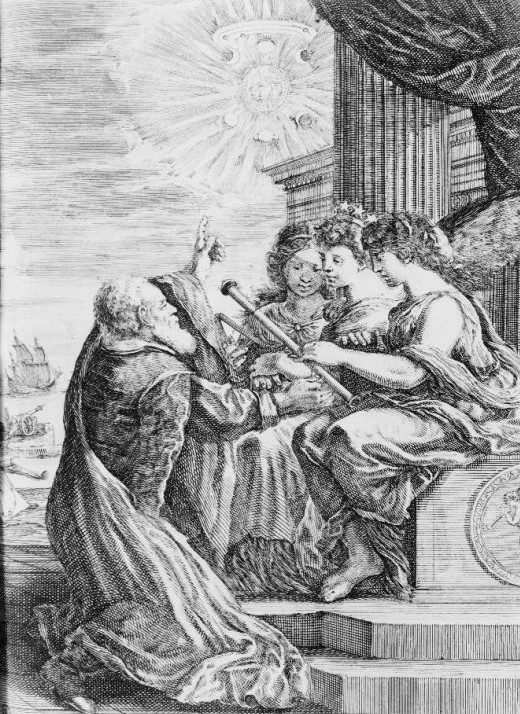The debate over the theory of evolution continues into the 21st century particularly in societies with a religious bent, including the United States of America. Yet, while the theory and corresponding evidence comes under continuous attack from mostly religious apologists, we generally do not see scientists themselves persecuted for supporting evolution, or not.
This cannot be said for climate scientists in Western countries, who while not physically abused or tortured or imprisoned do continue to be targets of verbal abuse and threats from corporate interests or dogmatic politicians and their followers. But, as we know persecution of scientists for embodying new, and thus threatening, ideas has been with us since the dawn of the scientific age. In fact, this behavior probably has been with us since our tribal ancestors moved out of Africa.
So, it is useful to remind ourselves how far we have come and of the distance we still have to travel.
[div class=attrib]From Wired:[end-div]
Turing was famously chemically-castrated after admitting to homosexual acts in the 1950s. He is one of a long line of scientists who have been persecuted for their beliefs or practices.
After admitting to “homosexual acts” in early 1952, Alan Turing was prosecuted and had to make the choice between a custodial sentence or chemical castration through hormone injections. Injections of oestrogen were intended to deal with “abnormal and uncontrollable” sexual urges, according to literature at the time.
He chose this option so that he could stay out of jail and continue his research, although his security clearance was revoked, meaning he could not continue with his cryptographic work. Turing experienced some disturbing side effects, including impotence, from the hormone treatment. Other known side effects include breast swelling, mood changes and an overall “feminization”. Turing completed his year of treatment without major incident. His medication was discontinued in April 1953 and the University of Manchester created a five-year readership position just for him, so it came as a shock when he committed suicide on 7 June, 1954.
Turing isn’t the only scientist to have been persecuted for his personal or professional beliefs or lifestyle. Here’s a a list of other prominent scientific luminaries who have been punished throughout history.
Rhazes (865-925)
Muhammad ibn Zakariy? R?z? or Rhazes was a medical pioneer from Baghdad who lived between 860 and 932 AD. He was responsible for introducing western teachings, rational thought and the works of Hippocrates and Galen to the Arabic world. One of his books, Continens Liber, was a compendium of everything known about medicine. The book made him famous, but offended a Muslim priest who ordered the doctor to be beaten over the head with his own manuscript, which caused him to go blind, preventing him from future practice.
Michael Servetus (1511-1553)
Servetus was a Spanish physician credited with discovering pulmonary circulation. He wrote a book, which outlined his discovery along with his ideas about reforming Christianity — it was deemed to be heretical. He escaped from Spain and the Catholic Inquisition but came up against the Protestant Inquisition in Switzerland, who held him in equal disregard. Under orders from John Calvin, Servetus was arrested, tortured and burned at the stake on the shores of Lake Geneva – copies of his book were accompanied for good measure.
Galileo Galilei (1564-1642)
The Italian astronomer and physicist Galileo Galilei was trialled and convicted in 1633 for publishing his evidence that supported the Copernican theory that the Earth revolves around the Sun. His research was instantly criticized by the Catholic Church for going against the established scripture that places Earth and not the Sun at the center of the universe. Galileo was found “vehemently suspect of heresy” for his heliocentric views and was required to “abjure, curse and detest” his opinions. He was sentenced to house arrest, where he remained for the rest of his life and his offending texts were banned.
Henry Oldenburg (1619-1677)
Oldenburg founded the Royal Society in London in 1662. He sought high quality scientific papers to publish. In order to do this he had to correspond with many foreigners across Europe, including the Netherlands and Italy. The sheer volume of his correspondence caught the attention of authorities, who arrested him as a spy. He was held in the Tower of London for several months.
[div class=attrib]Read the entire article after the jump.[end-div]
[div class=attrib]Image: Engraving of Galileo Galilei offering his telescope to three women (possibly Urania and attendants) seated on a throne; he is pointing toward the sky where some of his astronomical discoveries are depicted, 1655. Courtesy of Library of Congress.[end-div]

